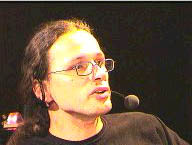*CAN THE INTERNET
MAINTAIN ITS ROLE AS A "DIRECT" MEDIUM?*
Gerfried
Stocker,
Artistic Director AEC,
Linz

<mp3>
<ra>
“There are so many media-experts who were dealing with the problems
of this war, both in the ‘‘Official Media‘‘ as well as the “Unofficial
Media.” We really need an artist to create a situation that wasn’t
just describing and documenting what was going on, but rather for
using the reality of the war in his own work. For example, using the
radio here in Austria, employing RealAudio streams, and using the
diaries which became popular were kinds of “cult-activities” during
this time. The artist wasn’t just describing the situation in Belgrade,
he was describing the state of our society at present by using different,
varied media like the Internet. And at this moment in Europe we probably
just realized the different possibilities that this media could offer.”
Of course we shouldn’t have too much hope for the impowerment of the
civil sector, the third sector, with the development of the Internet
and new media because there are still a minority of people who are
utilizing it. And in the minority of the civil sector there is still
just a minority of people who are interested in dealing with social
issues. Although I think all the events going on around the diary
of Jasmina Tesanovic, for example,
or the FREE B92
campaign prove that you can reach a much larger audience with this
new media. Maybe it doesn’t help so much (Prof.
Ivanji asked how it helps if we get this information from Eritrea,
or from Tschetschenia, or from Iraq, or from Belgrade ... it probably
doesn’t help the people of Eritrea, or Tschetschenia, or anywhere
else, in a direct way. But having the opportunity of having parallel
fields of action, in the so-called “Official Media‘‘ and the official
public opinion as well as alternative data and information, helps
us identify the enemy as well as relations between “good” and “bad.”
It’s a normal process when media polarize. Media only work when they
are polarized against one another.”
<mp3>
<ra>
“It is really more a question of “How can we team up to have a voice
in the commercial media that we are competing with (there is nobody
here who can do anything about it)? How can we reserve a space for
us?” I think there are many opportunities with the commercial boom
of the Internet. The commercial boom will make it so that the Inernet
will be much cheaper, much more available. And only because of the
commercial development of the Internet we might finally come to a
situation where maybe not just twenty or thirty percent of Austrians
have access to the Internet, but maybe seventy, eighty, or sometimes
even one hundred percent. And so as intellectuals and artists in this
country, we have to look for possibilities to create new spaces. This
is really something which seems to be very important in our situation.”
